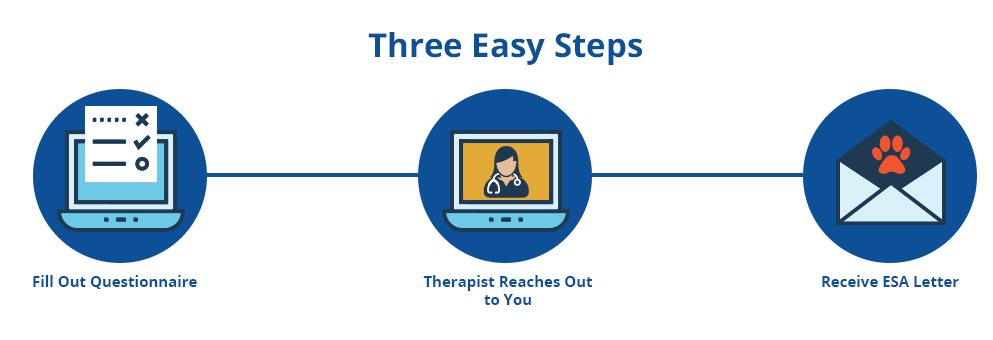How to Qualify for An Emotional Support Animal

To qualify for an emotional support animal under the Fair Housing Act, you need to follow these three steps:
- Get evaluated by a licensed mental health professional
- Get a signed and dated ESA letter from them.
- Give the ESA letter to your landlord so you can bring your support animal into “no pets” housing without paying pet fees or being subject to weight and size restrictions.
The most important step is getting an ESA letter that meets HUD’s housing rules for emotional support animals. Make sure your ESA letter has the following:
- The provider’s license number and contact information
- A statement that you have a mental health condition that substantially limits a major life activity
- Confirmation that an emotional support animal would help you
- The date the letter was issued
- The provider’s signature
You should also ensure that your ESA letter is not more than a year old when submitting it to your housing provider. Your landlord might contact the mental health professional to verify the letter, and your provider will need a recent evaluation (within one year) on file to confirm your ESA letter is still valid. Having an ESA letter that is outdated or unverifiable can disqualify you from having an emotional support animal in no-pets housing.
What Disorders Qualify You as An Emotional Support Animal Owner
Emotional support animals can have many health benefits. Some conditions that qualify for an ESA letter include:
- Depression
- Anxiety
- PTSD
- Panic Disorders
- Learning disorders
- Attention Deficit Disorder
- Tourette’s syndrome and tic disorders
- Motor skill disorders
- Bipolar disorder
- Dysphorias and dysmorphias
No matter the condition, it has to be severe enough to “substantially limit” one of your major life activities. That includes activities like working, studying, sleeping, and socializing.
Emotional Support Animal Training
The great thing about emotional support animals is that they don’t need to be trained to perform any specialized tasks the way a psychiatric service dog would. An emotional support animal does its job to make you feel better by just being there for you. Your pet might already be doing a great job as your emotional support animal before you can officially call it one by getting an ESA letter.
See if you qualify for an Emotional Support Animal letter by clicking the button below.

About the Author: The writing team at Service Dog Certifications is made up of folks who really know their stuff when it comes to disability laws and assistance animals. Many of our writers and editors have service dogs themselves and share insights from their own experiences. All of us have a passion for disability rights and animals.
Latest Posts

Dangerous Materials Hiding in Your Dog Products
Jake’s German Shepherd began developing strange rashes around his collar. Three vet visits later, they figured out the leather was treated with chromium — a chemical that irritates sensitive skin. Jake had no idea his dog’s collar contained industrial chemicals. Most dog owners don’t know what goes into the products they buy. Many companies use […]

Read More

Can You Bring a Service Dog to a Basketball Game?
Yes, you absolutely can bring your service dog to basketball games. Whether you’re heading to your local high school tournament, a packed college rivalry game, or splurging on NBA tickets, the Americans with Disabilities Act protects your right to be accompanied by your service dog anywhere the public can go. When you arrive, venue employees […]

Read More

Best Pet Health Insurance Providers
If you own a pet, you know how important — and expensive — vet care can be. One way to offset those costs is to purchase pet health insurance. Like typical health insurance, pet insurance is available at many price points, and can cover all, most, or only some of your vet-related costs. It can […]

Read More